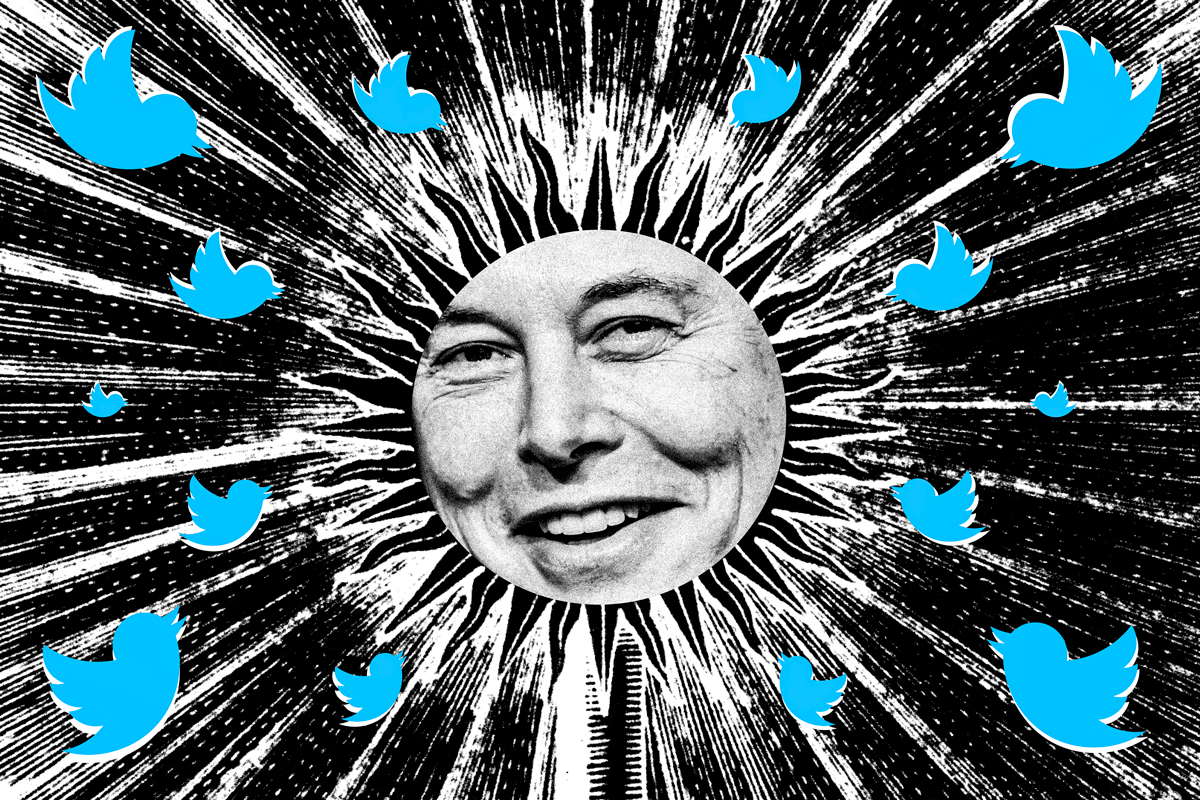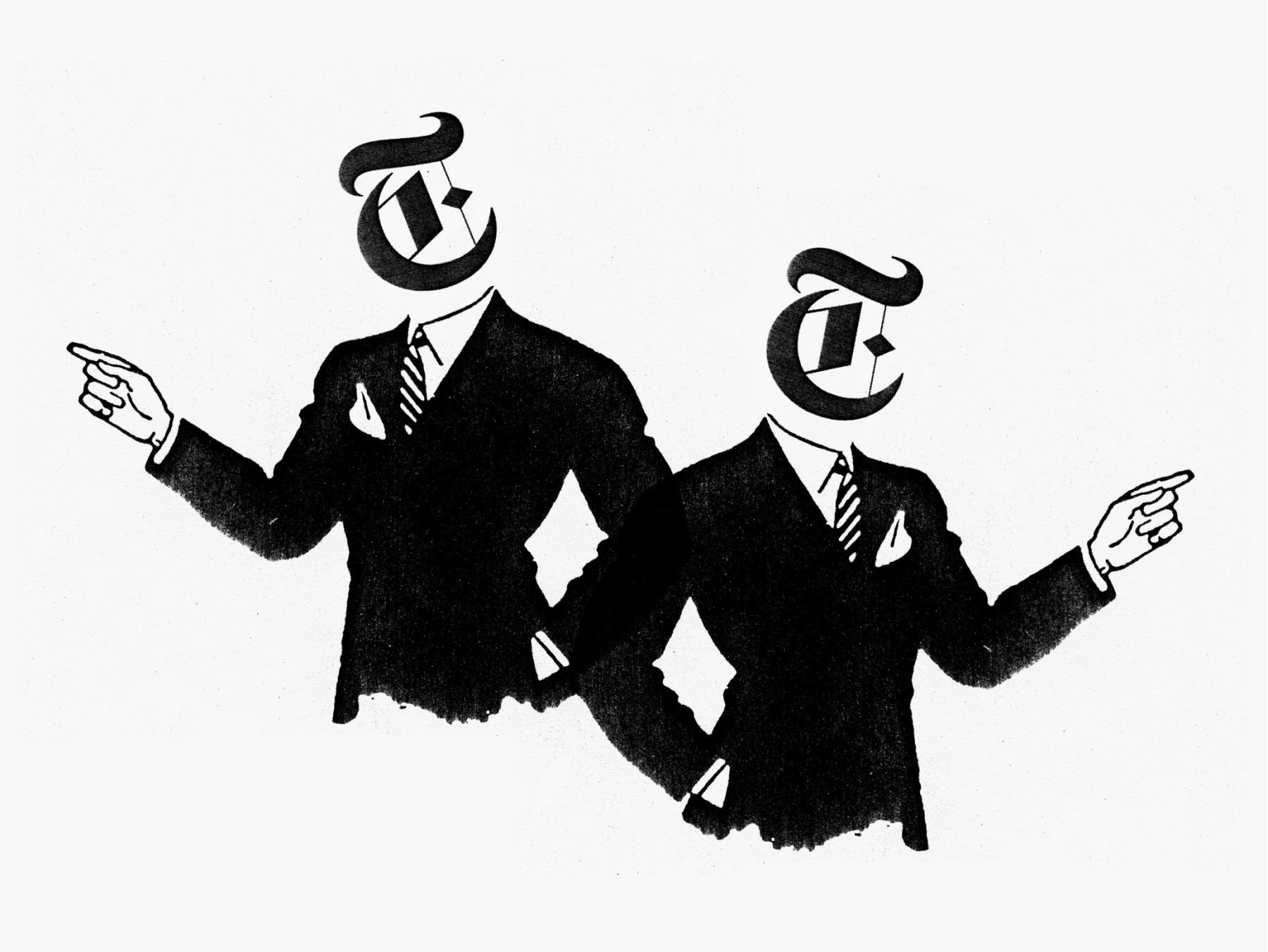Elon Musk has always sought to be known as a colonizer of space—but in the wake of his pending $44 billion deal to acquire Twitter, he’ll perhaps be more aptly remembered as a conqueror of spaces.
This latest takeover reminds us that, beyond Musk’s pet comic book narrative of transporting earthlings to Mars, where we’ll have “a lot of jobs” and live under his rules, his success lies in identifying new territories to exploit, commandeering the necessary technology, and pouncing.
We see this in his Boring Company, which aims to dig the tunnels beneath cities in order to catalyze subterranean metropolises served by “hyperloop” trains shooting through low-pressure tubes.
We see this in his Starlink effort to flood low-orbit space with 42,000 satellites in order to dominate broadband internet. Low orbit space is a mere 350 miles from the surface of Earth: It’s as if Musk eyed from Silicon Valley a vast reserve of lightly occupied real estate offshore of Los Angeles and sent his armada to grab it.
Even his best known project—the electric-car Tesla empire—was a leveraged mobilization of his PayPal fortune to create the aura of radical innovation, when the basic engineering behind the Tesla had already been established and government subsidies made it pay.
That is Elon Musk’s self-enriching brilliance—to see spaces ripe for colonization just above the clouds or right under our feet.
And now he has taken control of Twitter, that space where, for better or worse, our political possibilities are contested and, ultimately, manufactured.
The land, like Seward’s Alaska, was largely assumed to not be worth nearly the money Musk rustled up to pay for it, especially given that the heavily populated social media platform remains unprofitable. People scratching their heads at the billions Musk has apparently overpaid chalk it up to his adolescent nature demanding attention.
After all, he enjoys presenting himself as just a lone bro who, when snarking whatever is on his mind, should be entitled to freedom of speech. Never mind that he is the world’s richest man with 85.4 million Twitter followers, many of whom consider him an oracle, which gives his every tweet tremendously unequal power in the public conversation. We are supposed to believe Musk went to all the expense and trouble of buying Twitter in the idealistic pursuit of a level playing field for all.
Of course, that’s how colonizers always talk upon arrival, painting pictures of how life will be better, folks, now that I’m in charge.
But history tells us what drives imperialists. They generally come to plunder wealth created by others, destroy cultures, and eventually leave a mess when their focus and will dissipate. Expect to see this unfold at Musk’s Twitter.
We already know that he’s not into power sharing. A condition of his hostile takeover was that he take the company private in order “to go through the changes that need to be made.”
At the top of his list of such necessary changes is doing away with content moderation in order to suit Musk’s “absolutist” views on free speech. In other words, he intends to sweep aside the repository of internally refined understandings, policies and algorithms that took Twitter’s 7500 employees years to develop in order to keep their platform from being a nonstop toxic nightmare. Another way to describe what has been built up through trial and error and serious thought is that Twitter, during its long tour through the social media wilderness, achieved a measure of cultural wisdom.
Musk intends to sweep aside the repository of internally refined understandings, policies and algorithms that took Twitter’s 7500 employees years to develop in order to keep their platform from being a nonstop toxic nightmare.
Now Lord Elon comes to rend all that asunder—and by going private he can do so free of nagging public shareholders, quarterly reports, and oversight from the Security and Exchange Commission, which has already visited steep penalties on his stock manipulations at Tesla. Small wonder that, as the barbarian king strides through the gates, his trembling new minions reportedly weep with fear that he will undo all they’ve built, and democracy to boot.
Musk will not be the first occupier to impose a self-serving worldview on those colonized while ignoring why their culture evolved as it did. As many critics have pointed out, his stated conviction that Twitter is the universal “town square,” and best left largely unattended, is simplistic on both counts. “The internet itself is the town square,” notes Mike Masnick in TechDirt. “Twitter is just one private shop in that town square with its own rules.”
Or, as Renée DiResta writes in The Atlantic, “Twitter serves less as a town square than as a gladiatorial arena. It’s where competitors kill off one another while the crowd cheers, where teams compete in winner-take-all contests, where unending ideological demolition derbies go in circles.”
Such realities have demanded that Twitter take responsibility for what goes on inside its borders. Thus it operates out of the hard-won, if certainly not perfected, expertise it has developed for combatting myriad racists, terrorists, deadly liars and other democracy-destroying trolls, including one particular coup-plotter-in-chief.
The banal term for what Twitter’s employees have made a cornerstone of their work culture is content moderation—a complex field about which Elon Musk appears to have zero comprehension, as Masnik masterfully demonstrates in his TechDirt deconstruction of a recent Musk TED interview.
Listening to Musk share his ideological naivete about the virtues of digital “free speech,” Masnik hears what “techies who originally created social media said in the early days. And here’s the important bit: all of them eventually learned that their simplistic belief in how things should work does not work in reality and have spent the past few decades trying to iterate. And Musk ignores all of that while (somewhat hilariously) suggesting that all of those things can be figured out eventually, despite all of the hard work many, many overworked and underpaid people have been doing figuring exactly that out, only to be told by Musk he’s sure they’re doing it wrong.”
Musk’s own behavior on Twitter underscores the fact that, for a genius, he consistently demonstrates himself to be a real idiot, and dangerously so. He tweeted “the coronavirus panic is dumb” two weeks before the World Health Organization declared a pandemic. That same March of 2020, the U.S. Centers for Disease Control predicted between 200,000 and 1.7 million Americans would die, depending on how seriously people embraced self-isolation and other measures. Hearing that, Musk tweeted that new coronavirus infections would drop to close to zero by the end of April and told his employees to keep toiling and not worry.
In Canada, where I live, he informed his huge audience in February of this year that the nation’s elected leadership was illegitimate, right at the moment when a convoy of truckers had rolled into the capital demanding the overthrow of the government. Musk saw all those vaccine mandate-hating right-wingers driving their big rigs into Ottawa and tweeted: “If the government had the mandate of the people, there would be a significant counter-protest. There is not, therefore they do not.” And: “It would appear that the so-called ‘fringe minority’ is actually the government.”
Never mind that nearly 90 percent of Canada’s truckers were vaccinated, so the convoy was not representative even of drivers—much less the nearly three out of four polled Canadians who believe truckers should be vaccinated or have to prove they are Covid-free at the border.
Then there was the matter of the actual far-right “fringe minority” extremists tied to the convoy and the hate some of them spew. Musk doubled down by tweeting a meme comparing Adolph Hitler favorably to Prime Minister Justin Trudeau. Why is this American big shot trying to destabilize our country, wondered Canadians who know something about colonization.
Musk’s own behavior on Twitter underscores the fact that, for a genius, he consistently demonstrates himself to be a real idiot, and dangerously so.
What Musk was trading in at the time is “cheap speech”—a term coined by First Amendment scholar Eugene Volokh in 1995 for the wide-open new discourse the internet would allow, with citizens now empowered to bypass traditional media gatekeepers.
“What Professor Volokh did not foresee in his largely optimistic prognostication was that our information environment would become increasingly ‘cheap’ in a second sense of the word, favoring speech of little value over speech that is more valuable to voters,” observes Richard L. Hasen in The New York Times.
Twitter and other platforms are naturally inclined to favor and encourage cheap speech because, as Hasen puts it, “It is expensive to produce quality journalism but cheap to produce polarizing political ‘takes’ and easily shareable disinformation.” There’s gold in those memes! And, like Facebook’s Zuckerberg, Musk seems to grasp that the richest veins reside at the polarized fringes of opinion. A week before his Twitter buy, Musk tweeted, “A social media platform’s policies are good if the most extreme 10% on left and right are equally unhappy.”
And so cheap speech is the commodity that Elon Musk now seeks to mine, promote and sell more aggressively, once he has put Twitter “through the changes that need to be made.” The outsized debt he must service compels him to transform Twitter into El Dorado. In so doing, he will be following the age-old script of the colonial invader. He will deem benighted the cultural wisdom accumulated by the inhabitants. He will set about monetizing what can be extracted from their world—even if it pollutes and divides and kills. And he will take for granted the fact that Twitter is the product of the labor of millions of people—every tweeter who ever posted plus every Twitter worker who strived to make their realm habitable and thriving.
All this wealth created by others Musk will lay claim to until the ledgers don’t satisfy, the excitement wanes, and the conquering hero’s will recedes.
Skeptics of Musk’s gambit point out that changing a company’s culture requires either a fast round of bloodshed or persistent, engaged leadership. Musk seems unlikely to possess the stomach for either course of action. In the past, he has built his companies from scratch, imprinting employees with the loyalty of a Praetorian guard. Now he inherits a foreign land with which he has long been at war. You can bet that resistance within is already forming. And that Musk has vastly underestimated the challenge he is taking on.
Eventually, as with most brute force occupations, reality will replace visions of glory and uplift. This is sad to contemplate, because even though the infrastructure for discussion Twitter provides today is flawed and rickety, its offices are populated by some who understand how destructive to democracy disinformation and unchecked bad faith can be. These wise ones most certainly will be purged under the new regime.
And what will remain by the time Musk tires of ruling Twitter, after his plunder and retreat? I see scorched space, a desert of reason strewn with bones and feathers.
David Beers founded and edits The Tyee, Canada’s oldest digital-only public interest news site, based in Vancouver. His Silicon Valley memoir is Blue Sky Dream.



